Freezer Burned: Tales of Interior Alaska
Posted December 20, 2020 at 5:30 am by Hayley Day
“Freezer Burned: Tales of Interior Alaska” is a regular column on the San Juan Update written by Steve Ulvi.
The Mail Will Be Delivered: Part I
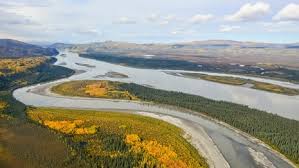 On a dazzling autumn day, sometime in the mid-1930s, Eddie Hindermann tipped his hat back pausing in his labors, leaning on a shovel, catching a blow. He squinted while looking upriver into the sparkle of reflected sunlight. His sweated shirt cooled his back as he scanned the color-splashed terrain of the Yukon River. Hard frosty nights, always a chance at a moose or two now. In the alpine background, grey limestone peaks long ago pushed up from an ancient ocean floor that was rafted in from the depths of time, shouldered the deep valley of the Tatonduk River that quickly flowed to mix with the broad milky river.
On a dazzling autumn day, sometime in the mid-1930s, Eddie Hindermann tipped his hat back pausing in his labors, leaning on a shovel, catching a blow. He squinted while looking upriver into the sparkle of reflected sunlight. His sweated shirt cooled his back as he scanned the color-splashed terrain of the Yukon River. Hard frosty nights, always a chance at a moose or two now. In the alpine background, grey limestone peaks long ago pushed up from an ancient ocean floor that was rafted in from the depths of time, shouldered the deep valley of the Tatonduk River that quickly flowed to mix with the broad milky river.
For the lanky man with strong Athapaskan features, it was a familiar, yet very distinct landscape given the tight warp and weave of old natural elements and recent human interests. Stories within stories revealed. The notable landforms exhibit highly varied geology, slowly sculpted by the timeless flowing river, but not u-shaped by vast bull-dozing valley glaciers. The deep continental region was far too arid. Remarkable cliffs tower many hundreds of feet above the shoreline or stand majestically beyond a grey-green scrim of forest. Uniquely colored and shaped, they all carry notable names.
The scattered locations of individuals and camps, all determinedly engaged in resource use, were equally distinct outcrops, but of humanity. The recent New Deal recovery policies included increased gold prices from $20 to $35 per ounce and forbidding hoarding, to stimulate late Depression monetary expansion. Coastal fisheries and logging shrank back but the scant population of Alaska (less than 2,000 residents in Fairbanks) and especially bush Alaska, hardy and self-reliant, changed little.
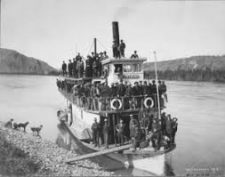 In the 1930s the south bank placer mining operations at Eagle, 4th of July, Coal, Ben and Woodchopper Creeks benefitting from the huge Tintina Fault zone, buzzed with activity and increased mechanization. No gold was ever found on the northside of the huge fault and present river course. Sternwheelers transported all the materials; pipe for hydraulic nozzles, building materials, heavy equipment, rails and cars for narrow gauge railroads and huge floating bucket dredges shipped piecemeal from industrial centers like Oakland, California to be reassembled on site.
In the 1930s the south bank placer mining operations at Eagle, 4th of July, Coal, Ben and Woodchopper Creeks benefitting from the huge Tintina Fault zone, buzzed with activity and increased mechanization. No gold was ever found on the northside of the huge fault and present river course. Sternwheelers transported all the materials; pipe for hydraulic nozzles, building materials, heavy equipment, rails and cars for narrow gauge railroads and huge floating bucket dredges shipped piecemeal from industrial centers like Oakland, California to be reassembled on site.
As the contract U.S. mail carrier, following in his father’s snowshoe tracks, he was hard at work preparing for a winter of freighting and mail delivery by dog sled over the 160 mile stretch between Eagle and Circle City, Alaska. His brother, Adolf, was his partner and backup carrier.
With deep family roots, “Yukon water in his veins”, Eddie was one of nine surviving children from the lasting marriage of an enterprising Bohemian immigrant and a determined Athapaskan woman who happened to be the grand-daughter of a clan chief of renown. An older brother died in 1919, during the influenza pandemic, out at Nome. A favorite little sister had drowned in a boating accident and was never found. For years after Eddie walked back sloughs searching log jams for some sign of her remains. The cold northern waters have taken many native lives through history as swimming is not a life skill taught.
Hindermann Camp had been purposely built halfway between the two shrinking frontier river towns for the good fishing sites. A patchwork of sturdy log cabins, a large garden patch and roofed drying racks for split salmon clustered on a level bank twenty feet above highwater. Scores of local sled dogs were boarded and chained along the beach in summers, while several tons of dried salmon were baled for transport via steamboat. Old man Hindermann successfully bid on the winter mail contract for “the loneliest mail route” in 1912 as the region steadily depopulated following the waves of migrations to new discoveries fueled by viral rumors of new riches after all the good ground was staked. In 1925 or thereabouts, after over a decade of carrying mail he badly froze his feet, lost some toes, and teen-aged Eddie had to step up to finish out the winter and keep the contract.
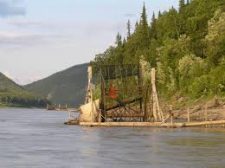 Several long, narrow river boats hugged the cobbled shore at their homesite as two large fishwheels turned in the turbid current causing their wooden axles to moan with each splashy turn. Several hundred fall chum salmon were still laboriously processed by the family every day even as the peak season wound down. The dropping water levels required regular adjustments to the wheels and submerged ‘fences’ that guided the migrating salmon into the curved wire baskets.
Several long, narrow river boats hugged the cobbled shore at their homesite as two large fishwheels turned in the turbid current causing their wooden axles to moan with each splashy turn. Several hundred fall chum salmon were still laboriously processed by the family every day even as the peak season wound down. The dropping water levels required regular adjustments to the wheels and submerged ‘fences’ that guided the migrating salmon into the curved wire baskets.
Eddie had come from Eagle and was hard at work repairing shoreline access to the wide trails in the forest that had been used for decades to cut across large river bends, connecting most of the active roadhouses and gold mining operations strung along the river. Come November 1st he would be battling rough ice and open water where steep bluffs forced sticking to the river to reach the trail corridors with his large dog team and traditional sled. With few exceptions, 500 pounds was the load limit.
High summer water always left drift logs and cut banks that needed to be cut out and filled in before snowfall. Treefall and wildfire wreaked havoc, and if other locals hadn’t already cleaned things up, would necessitate rerouting or clearing for mail transport later on. Shovel, pickaxe and crosscut saw work left him and his teen-aged nephew, Joseph, sweating and brushing away a few mosquitos in the mid-day warmth.
They built a tea fire, fried up sliced Spam, and warmed frybread for lunch while sharpening tools. Eddie teased his teen-aged nephew as they smoked. He well knew that his church-going sister disapproved of tobacco use and grinned while imitating her worried voice describing discovering women’s undergarment pages ripped from the Sears Catalogue under Joseph’s bed frame. Blushing and muttering some the serious young man stood and started packing.
As they kicked gravel over the coals and toted the lunch box and tools, the rhythmic churning of a steamboat announced the approach of the SS Yukon II pushing a barge and carrying mail from Fairbanks to Eagle and river outposts. Probably one of the last runs of the season. Cap Cobbett sounded the horn from the high wheelhouse as a couple of deckhands waved to Eddie as he hurried to motor their 32-foot wooden riverboat out to cut the rolling wake of the sternwheeler that steadily pushed upriver in the main channel.
Eddie hollered over the two-jug diesel “not too much wood on her deck, bet he woods-up at Miller Camp. Lot of those fuel barrels probably for his tractor. You see Barney Hanson’s new truck on the barge!” Joseph nodded as they turned downriver, but was thinking of Heinie Miller’s attractive daughters and the berry pie they had shared yesterday. Over strong coffee, the forgetful Heinie repeated the story about his woodcutter who had been felling on Wood Island in early May, when the surging breakup ice jammed at the bluff. The rapid backup of swirling cold flood water forced him to belt himself high in a big spruce tree for 24 sleepless hours before the ice dam broke and murky water receded. The high water and ice had floated off 75 cords of neatly stacked boiler wood and flooded a couple of cabins around the busy camp.
Eddie knew most of the contract woodcutters operating every 15-20 miles along the river. Many were native fellows. They labored all winter to provide a contracted amount of 4-foot cordage at the bank where a company sternwheeler could nose in. These simple camps were lonely outposts where dense stands of smaller trees stood. Dark to dark, the brief days of winter were punctuated with the thunk of double-bit axes and rhythmic crosscut sawing. Miller used a cranky old cable D-2 cat, more rusted than yellow, to pull tandem wood drays to the river bank. Most others used a few big dogs or horses with lighter loads.
The shallow draft sternwheelers burned a cord (128 cubic feet) or more per hour to make steam to churn at tops 7 mph against the current, loaded with every imaginable kind of freight. The firemen were lowest on the pay scale and toiled in pairs to feverishly stoke the cavernous firebox while underway. All of the loading and unloading at the bank, almost without respite under the midnight sun, required human toil and ingenuity using long ramps, metal wheeled barrows, large block and tackle and boom hoists.
The shifting river bars and channel changes required excellent navigation skills and reading the roiling waters. Getting free of a sandbar, especially when grounded on a nervy downstream run, could only be rectified in a few ways, all time-consuming; temporarily offload freight, run winch cables to large shoreline trees, wash out the bar with the paddle wheel reversed or use the bow spars to “walk” off the bar like on crutches. Or pray and wait for more water. The hazards to flesh and bone from the immense counter-forces involved in these operations were many.
Eddie had once put in a summer as a deckhand but soon regretted the endless hours and noise, much-preferring activities around the family homestead during the summer and being his own boss all winter. He was angered by the crudeness and overt racism of some of the crusty deckhands, especially those from the Missouri River. The loud bragging about the village women they plied with alcohol during festive fiddle dances sickened him. His only season was cut short when he badly crushed two fingers (losing one) while off-loading steel fuel barrels. The next spring, due to his extensive local knowledge, he was hired to help map and mark the changed main channel on the official navigation cutter.
As the pair motored downriver there was smoke on the water from many stoves and campfires, seemingly at every creek mouth where boats and stuff were beached. Eddie dropped Joey and an ax at the ruins of Montauk Roadhouse planning to meet him at the other end of the 5-mile trail coursing through stunted black spruce and annoying sedge tussocks (everyone called them ‘niggerheads’). As expected, there was little maintenance needed given the small, sparse trees. Eddie had a smooth ramp constructed by the time Joseph showed up thirsty and sweated up, saying that he had jumped a mulligan bull and cow moose. He dunked his head in the river. The winter trail from where they sat would course behind miles of islands and in dry sloughs, “about as good as it gets” said Eddie. All the way to Trout Creek.
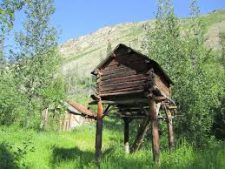 As they motored downriver, Eddie expected that Chris Nelson would be building a cabin at Nation Bluff after fixing old trapline cabins far up the Nation itself over the summer. Nelson was a tall, wiry ‘Scandahoovian’ bachelor who like everyone else prospected some and trapped fur. Eddie knew that Nelson had attracted the attention of Sam White, a wide-ranging bush pilot and game warden, over trapline infringements and reputed illegal use of strychnine to kill wolves and bears. Nelson was nicknamed “Phonograph” for his habit of filling any lulls in a conversation with meaningless utterances. Smoke drifted through the spruce to the riverbank, floating on the water, as they quietly eased in and tied up next to a tunnel boat that had seen better days.
As they motored downriver, Eddie expected that Chris Nelson would be building a cabin at Nation Bluff after fixing old trapline cabins far up the Nation itself over the summer. Nelson was a tall, wiry ‘Scandahoovian’ bachelor who like everyone else prospected some and trapped fur. Eddie knew that Nelson had attracted the attention of Sam White, a wide-ranging bush pilot and game warden, over trapline infringements and reputed illegal use of strychnine to kill wolves and bears. Nelson was nicknamed “Phonograph” for his habit of filling any lulls in a conversation with meaningless utterances. Smoke drifted through the spruce to the riverbank, floating on the water, as they quietly eased in and tied up next to a tunnel boat that had seen better days.
Nelson was muttering and cussing a blue streak using a gin-pole to raise a log to his new cabin wall when heard Eddie call out “Hey the cabin!” and saw them come around the pole cache. His old mangy husky was all but blind and deaf, curled sleeping. “Jesus H Christ, Willie, ya good for nuttin’ mutt, Eddie got the drop of me!”. He leaned down and gave Willie a rub then greeted his visitors. “Hey dere fellas!, Eddie whatcha carrying there, anyhoose? How ‘bout tea”, pointing to the stumps and blackened tea can at the fire pit.
“Chris, this here is a nephew Joseph, and we brought along your mail and some books, mostly those detective stories you like, from Eagle. Looks like a roof over your head by snow if you’re ready to bend down some, eh”? joshed Eddie in his easy-going manner, sipping the caustic tea. “That lap siding from the Fort will go up quick for the entry if that’s your plan, I guess”. “Ya, dats the big idea, Eddie. I know I gotta get my dogs back up from your old man and pay up, those cabins up ta Nation are good to go, workin’ all summer on ‘em, you betcha”.
Joseph sat back listening in but was enjoying perusing the lurid paperback covers in the open box, that mainly seemed to be about bosomy blonds in distress. They spoke of mining camp doings, the “Mad Trapper” and the story of Louise Paul fending off a grizzly coming in a window with a chair to protect her kids at a Coal Creek cabin.
After a time, Eddie glanced at his pocket watch and tossed the dregs of his tea while rising. “Chris, your dogs are good alright, so come get ‘em”. “Ya, Eddie, I tell ya one t’ing, you see those damned Van Bibber brothers comin’ through later on you tell ‘em stay the hell off my trails and outta my cabins. Can’t help if dere lead dogs step in my main trail wolf sets, can I now? Ain’t gone sign em’ tat’s fer sure! Damned nosey Canucks musta turned me in to dat flying warden botherin’ us now. I won’t forget it”!
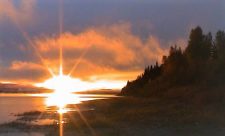 Eddie nodded without comment but knew that Nelson had been breaking the new laws. He nudged Joseph out of his fantasies and started back down the winding path with Chris and Willie bringing up the rear. “Good wetter sure now ta hang a moose, wood cutting you bet…ah ah ah ya ah eh ah ah ah em, and tanks for dem good books! Chris continued his muttering as they nodded, tugged hats tighter and eased the longboat back out on the wide river that flowed toward the roseate skies to the west.
Eddie nodded without comment but knew that Nelson had been breaking the new laws. He nudged Joseph out of his fantasies and started back down the winding path with Chris and Willie bringing up the rear. “Good wetter sure now ta hang a moose, wood cutting you bet…ah ah ah ya ah eh ah ah ah em, and tanks for dem good books! Chris continued his muttering as they nodded, tugged hats tighter and eased the longboat back out on the wide river that flowed toward the roseate skies to the west.
You can support the San Juan Update by doing business with our loyal advertisers, and by making a one-time contribution or a recurring donation.
Categories: Freezer Burned





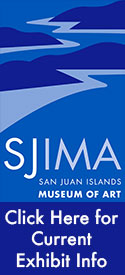





No comments yet. Be the first!
By submitting a comment you grant the San Juan Update a perpetual license to reproduce your words and name/web site in attribution. Inappropriate, irrelevant and contentious comments may not be published at an admin's discretion. Your email is used for verification purposes only, it will never be shared.